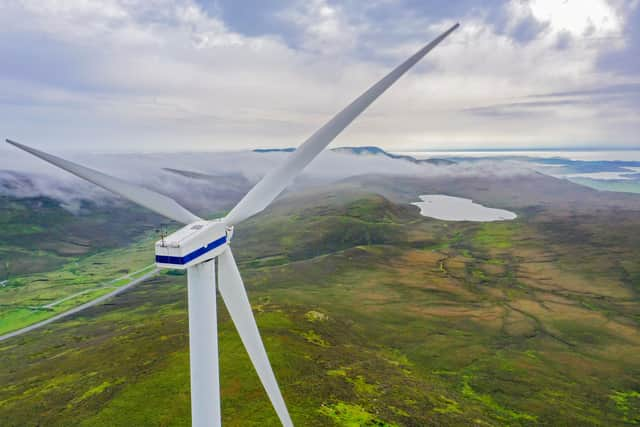Energy bills crisis: Renewable energy offers a solution to soaring gas prices so why are some calling for green levies to be cut? – Dr Richard Dixon
A group calling itself the ‘Net Zero Scrutiny Group’ is calling for a cut to green energy support, increased North Sea oil and gas extraction, and a revival for fracking.
Initially claiming to have the support of over 50 MPs, their letter to the Sunday Telegraph was signed by only 19 Tory MPs and one peer. The leader of the group, Steve Baker, is trustee of the long-standing and long-discredited climate-denying Global Warming Policy Foundation.
Advertisement
Hide AdAdvertisement
Hide AdTheir predictable demands received plenty of publicity just now because of the rising cost of household energy bills. But the logic of the their demands is backwards.
The main reason bills are rising – predicted to be 50 per cent higher by April – is because global gas prices are rising.
Gas prices are set by fluctuations in the global market and increased usage in Europe’s cold winter last year, the impact of Hurricane Ida on US supplies and increased use in China mean wholesale gas prices in the UK are now seven times what they were last spring.
Electricity prices closely follow gas prices because many countries, including the UK, use gas to generate a significant proportion of their electricity. In this case Scotland is being hard done by as gas produces almost none of the electricity we use here, with the rapidly expanding renewables sector supplying the equivalent of all our electricity demand last year.


Clearly it is essential that there is some immediate action but that should not be at the expense of the long-term solution. The best way to ensure people’s energy bills are manageable is to continue on the track we are going – getting out of fossil fuels and their volatile prices and switching heating and transport to renewable energy, which we can make here.
Although the cheapest electricity that energy companies can make or buy now comes from renewables, changing the system requires investment, hence the green levies that customers pay through energy bills.
The answer to a short-term crisis cannot be to abandon or seriously delay the long-term measures that would make sure that crisis cannot happen in future.
The Labour Party has proposed a windfall tax on North Sea oil and gas producers, removing the five per cent VAT on domestic energy bills for a year and increasing support for the poorest households. The Lib Dems have also called for a windfall tax on oil and gas companies.
Advertisement
Hide AdAdvertisement
Hide AdWhat they have both realised is that oil companies are selling their gas and oil at much higher prices just now, when their costs have not really changed at all, so they are all heading for record profits.
Of course the oil industry enjoys so many tax breaks and subsidies that the tax-payer ends up paying some of them rather than getting money into the Treasury from them, so any windfall tax would have to be more than just a simple increase in corporation tax levels.
We are heading for an energy bill crisis but we need to make sure the necessary short-term fix is not at the expense of the permanent solution.
Dr Richard Dixon is director of Friends of the Earth Scotland
A message from the Editor:
Thank you for reading this article. We're more reliant on your support than ever as the shift in consumer habits brought about by coronavirus impacts our advertisers.
If you haven't already, please consider supporting our trusted, fact-checked journalism by taking out a digital subscription.
Comments
Want to join the conversation? Please or to comment on this article.
